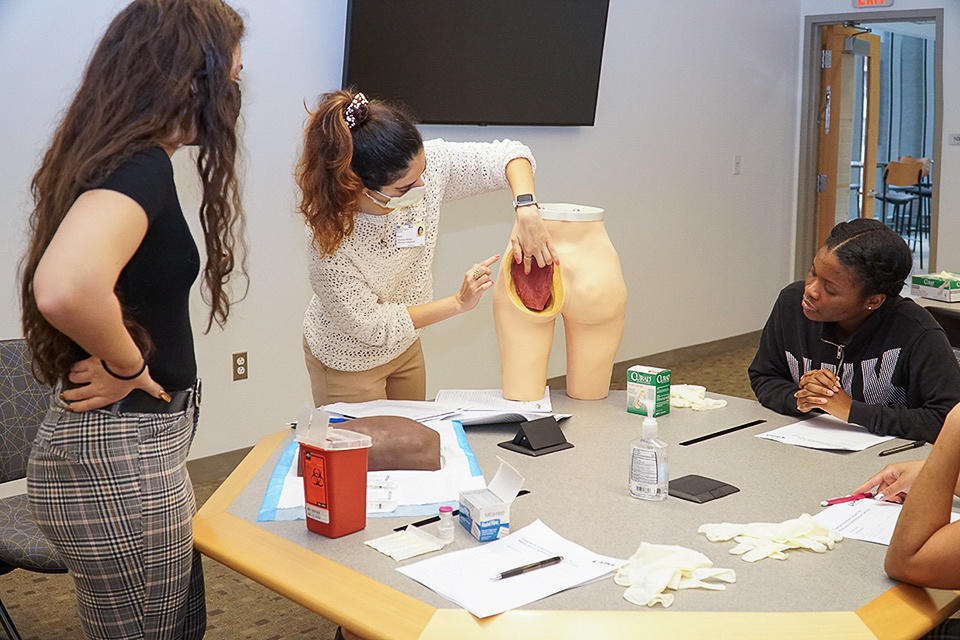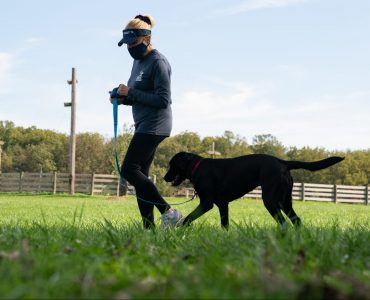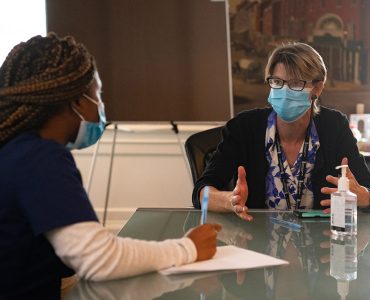
In 2022, a new state regulation was implemented that authorized pharmacists, with approved training from the Maryland Board of Pharmacy, to administer maintenance injectable medications in a community setting. As a result, the University of Maryland School of Pharmacy (UMSOP) became the first in the state to train its student pharmacists on the administration of long-acting injectable medications.
Third-year students in the school’s Abilities Lab 5 course received instruction starting in late 2022 on how to intramuscularly administer HIV, substance use disorder, and antipsychotic medications. Maryland joins many other states in allowing pharmacist administration of these long-acting forms of medications.
“Increasing access to medications is essential for Maryland’s citizens,” said Megan Ehret, PharmD, MS, BCPP, professor, Department of Practice, Sciences, and Health Outcomes Research (P-SHOR). “These long-acting injectable medications are lifesaving, and at times, prescribers might not have offered these treatments due to administrative concerns. Now, patients can get these medications at local pharmacies as well as prescriber offices. I am very excited to train our students to be on the cutting edge of pharmacy practice.”
The implementation of this new training into the school’s curriculum is the result of long-term advocacy by Ehret and fellow P-SHOR faculty members Raymond Love, PharmD, BCPP, FASHP, and Neha Pandit, PharmD, BCPS, AAHIVP, informing state policymakers on the need for expanded pharmacist authority. Previously, the state of Maryland allowed pharmacists to only administer medications, such as insulin or eye drops, that a patient also could give to themselves.
“During the COVID-19 pandemic, many patients receiving regular long-acting injectable medications lacked easy access to them,” said Love, who retired in May. “Maryland’s new law allowing pharmacists to administer these injectable maintenance medications is the perfect solution. Community pharmacists are the most accessible health professionals, and as they showed during the pandemic, they can also serve as the most accessible providers to administer these medications.”
Increasing Access
Ehret said UMSOP has trained 94 pharmacy students and is training another 95 students this fall.
“This training allows our students to hit the ground running upon graduation and normalizes the pharmacy as a place for pharmacists to administer medication,” said Jill Morgan, PharmD, BCPS, BCPPS, FNAP, professor and chair of P-SHOR.
During the training, students learned how to properly administer these injections and assess administrative considerations.
“As with any injectable medication or vaccine, it is essential to understand how to administer it correctly and safely,” student Gabrielle Jones said. “Many of the medications have additional safety considerations, but this training ensures that pharmacists are appropriately educated on handling them. I am excited that I can provide patients with expanded access to their medications now.”
Training Around the Country
Ehret said even if the students don’t use the training in the future, the trainings are beneficial.
“The most rewarding part is knowing that the training is exposing so many different health care providers to the various long-acting injectable medications,” she said. “Even if they don’t end up providing this service in the future, they are now aware of the medications and the important role that they play in the treatment of so many diseases.”
Ehret said UMSOP also trained over 200 pharmacists at the American Association of Psychiatric Pharmacists’ annual meeting, 50 mental health care professionals at the American Psychological Association’s annual meeting, and 40 pharmacists at the Maryland Pharmacists Association’s annual meeting. In addition, other schools of pharmacy have contacted UMSOP for information on how it implemented its program.
“There is a lot of interest in the program, and we are working on several additional trainings in the next year,” Ehret said.



